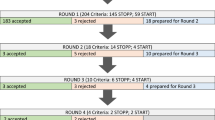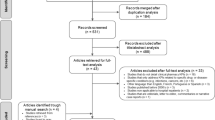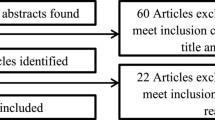Abstract
Purpose: This paper outlines recent fundamental changes in the framework of the German health care system and presents diverse managed care projects and initiatives to standarize patient management using guidelines as a response to these changes.
Main findings: Increasing health care costs and a decline in budget to the statutory health insurances have urged fundamental structural changes in the long-existing German health care system. New legislation introduced competition between health insurers and pushed for pilot projects in managed care. The concepts of some of the new initiatives are presented. All initiatives recognized the need for standardization and disease management, supported by guidelines. The consensus-based guidelines produced by different stakeholders, however, did not prove helpful in patient management. The foundation for an evidence-based, scientifically sound guideline development process has been laid by physicians’ organizations.
Conclusions: The most recent changes to the health care system are promising. Their impact on urgently needed changes in the health care system remains to be seen.
Similar content being viewed by others
References
U.S. Congress, Office of Technology Assessment, Health Care Technology and its Assessment in Eight Countries. OTA-BP-H-140. Washington, DC: U.S. Government Printing Office; February 1995.
Schwartz FW, Busse R. Germany. In: Chris Ham (ed.). Health Care Reform. Learning from International Experience. Buckingham, UK, Philadelphia, USA: Open University Press; 1997:105–118.
Beske F, Brecht JG, Reinkemeier A-M. The Health Care System in Germany. 2nd ed. Cologne; 1995.
Busse R, Howorth C, Schwartz FW. The future development of the rights based approach to health care in Germany: more rights or fewer? In: Hard Choices in Health Care: Rights and Rationing in Europe. Lenaghan J, ed. London: Br Med J.; 1997: 21–47.
Advisory Council for the Concerted Action in Health Care. Health Care and Health Care Insurance. Baden-Baden: Nomos-Verlag; 1994.
Wahner-Roedler DL, Knuth P, Juchems RH. The German Health Care System. Mayo Clinic Proceedings. 1997;72:1061–1068.
Buschmann P. Managed care models in Germany: Regional Office Network Kiel (RPK). Presented at the 47 German Physicians Congress, Berlin, May 27–29, 1998.
Wald A. Managed care from the perspective of the company sickness funds (BKK), and Dreykluft H.-R. Managed care from the perspective of a net-work physician. Presented at the 47th German Physicians Congress, Berlin, May 27–29, 1998.
Mehl E, Becker-Behles S. The General Sickness Funds (AOK)—Project on Diabetes in Thuringia. Berliner Änte. 1998;7:16–17.
Gerlach FM, Beyer M, Szecsenyi J. Guidelines in Hospital and Ambulatory Settings. Dt. Ärzteblatt. 1998;95(17):A-1014–1021.
Expert Advisory Panel of the National Council for the Concerted Action. Health Care and Health Care Insurance. Health Care and Health Insurance 2000. Individual Responsibility, Subsidiarity, Solidarity in a Changing Environment. Experts Report 1994. Eigenverlag o.O. 1994.
Expert Advisory Panel of the National Council for the Concerted Action. Health Care and Health Care Insurance. Health Care and Health Insurance 2000. More Outcome Orientation, Higher Quality, Higher Efficiency. Special report. Baden-Baden: Nomos-Verlagsgesellschaft; 1995.
http://www.uni-duesseldorf.de/WWW/AWMF/awmfleit.htm. Scientific Medical Societies. Home-page of Guidelines. Most Recent Update 1/12/1998. Accessed 8/4/1999.
Grol R, Lawrence M. Quality Improvement by Peer Review. Oxford: Oxford University Press; 1995.
Agency of Quality in Medicine, https://www.dgn.de/kammern_kven/AEZQ/. Accessed: 8/4/1999.
Field MJ, Lohr KN (eds). Guidelines for clinical practice. From development to use. Washington, DC: National Academy Press; 1992.
German Medical Association, National Association of Statutory Health Insurance Physicians. Quality Criteria for the Assessment of Guidelines in Health Care. Dt. Ärzteblatt 1997;94:A2154–2155.
Ollenschläger G, Helou A, Kostovic-Cilic L et al. Checklist for the methodologic quality of guidelines. ZaeFQ. 1998;92:191–194.
Luhmann D, Raspe H (1998) Establishing priorities. Influence of Evidence-based Medicine on Health Care Policy. Berliner Ärzte. 35:3/98, 19–20.
Advisory Council for the Concerted Action in Health Care. Health Care System in Germany. Economic Burden and Industry of the Future. Volume II. Special report 1997. Eigenverlag o.O. 1997.
Author information
Authors and Affiliations
Corresponding author
Rights and permissions
About this article
Cite this article
Kunz, R., Pientka, L. The Role of Evidence-Based Guidelines in Managed Care Pilot Projects in Germany. Ther Innov Regul Sci 33, 689–697 (1999). https://doi.org/10.1177/009286159903300305
Published:
Issue Date:
DOI: https://doi.org/10.1177/009286159903300305




